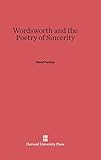Wordsworth and the Poetry of Sincerity / David Perkins.
Material type: TextPublisher: Cambridge, MA : Harvard University Press, [2013]Copyright date: ©1964Edition: Reprint 2014Description: 1 online resource (285 p.)Content type:
TextPublisher: Cambridge, MA : Harvard University Press, [2013]Copyright date: ©1964Edition: Reprint 2014Description: 1 online resource (285 p.)Content type: - 9780674424234
- 9780674424258
- online - DeGruyter
| Item type | Current library | Call number | URL | Status | Notes | Barcode | |
|---|---|---|---|---|---|---|---|
 eBook
eBook
|
Biblioteca "Angelicum" Pont. Univ. S.Tommaso d'Aquino Nuvola online | online - DeGruyter (Browse shelf(Opens below)) | Online access | Not for loan (Accesso limitato) | Accesso per gli utenti autorizzati / Access for authorized users | (dgr)9780674424258 |
Frontmatter -- PREFACE -- CONTENTS -- I. THE CHALLENGE OF SINCERITY -- II. SINCERITY AND COUNTER IDEALS -- III. THE PROCESS OF COMPOSITION -- IV. THE ADEQUACY OF LANGUAGE -- V. THE PSYCHOLOGY OF BELIEF -- VI. WORDSWORTH AND HIS AUDIENCE -- VII. RESOURCES OF STYLE AND EXPRESSION: I -- VIII. RESOURCES OF STYLE AND EXPRESSION: II -- IX. THE LATE POEMS -- NOTES INDEX -- ABBREVIATIONS USED IN NOTES -- NOTES -- INDEX
restricted access online access with authorization star
http://purl.org/coar/access_right/c_16ec
This book presents not just the Romantic Wordsworth, but Wordsworth as part of a large historical movement in poetry, beginning in the eighteenth century and continuing to the present day. It concentrates on the difficult, much discussed, but little analyzed problem of "sincerity" in poetry, which it treats both critically and historically, as a demand relatively new in Wordsworth's time and still with us. It contains an extended criticism of Wordsworth's later poems, and explores the vexing question of why the mode of his poetry changed as he grew older. The author shows that the ideal of sincerity has influenced poets, critics, and common readers from Wordsworth to now, and describes the problems raised for poets by this new challenge. The first problem is the adequacy of language--does the very structure and fact of language stand as an obstacle to a complete sincerity? Perkins says: "One can hardly explain the history of poetic style or, indeed, of literature since Wordsworth, unless one keeps in mind that there has been a continuing mistrust of language. By words, it is feared, we chop realities into categories. The categories are arbitrary, or, even if they are not, their generality strips our experience of its unique aspects." Another problem raised by the challenge of sincerity is the distrust of poetic form. How can you write with a personal sincerity when you have to use meters and stanzas? Or, more fundamentally, how can you be honest to the complexity and uncertainty of your own experience, when a poem must always be more limited than the consciousness from which it arises? Still another problem is the distrust of poetic conventions and traditions. The author says, "The wish to be sincere is challenged and baffled by the fact that poetry is a learned performance, that all poetic expression depends on traditions and conventions peculiar to the art and inherited from the past.Yet if you imitate the great achievements of the past, how can your poem be thought a sincere personal utterance? The question of imitation is only the most obvious result of this anxiety. For a fanatic sincerity may suppose that merely to be influenced by other writers--in fact, to be influenced by anything at all--somehow clouds the purity of self-expression."
Mode of access: Internet via World Wide Web.
In English.
Description based on online resource; title from PDF title page (publisher's Web site, viewed 24. Aug 2021)


